 |
|---|
| |
Elections to the French National Assembly were held in French Somaliland on 23 April 1967 as part of the wider French parliamentary elections. [1] Moussa Ali Abdoulkader was elected as the territory's MP. [1]
 |
|---|
| |
Elections to the French National Assembly were held in French Somaliland on 23 April 1967 as part of the wider French parliamentary elections. [1] Moussa Ali Abdoulkader was elected as the territory's MP. [1]
| Candidate | Votes | % |
|---|---|---|
| Moussa Ali Abdoulkader | 22,776 | 66.26 |
| Idriss Farah Abaneh | 11,052 | 32.15 |
| Four other candidates | 548 | 1.59 |
| Total | 34,376 | 100.00 |
| Valid votes | 34,376 | 99.36 |
| Invalid/blank votes | 220 | 0.64 |
| Total votes | 34,596 | 100.00 |
| Registered voters/turnout | 39,989 | 86.51 |
| Source: Sternberger et al | ||

Gabon, officially the Gabonese Republic, is a country on the Atlantic coast of Central Africa, on the equator, bordered by Equatorial Guinea to the northwest, Cameroon to the north, the Republic of the Congo on the east and south, and the Gulf of Guinea to the west. It has an area of 270,000 square kilometres (100,000 sq mi) and a population of 2.3 million. There are coastal plains, mountains, and a savanna in the east. Libreville is the country's capital and the largest city.

The president of France, officially the president of the French Republic, is the executive head of state of France, and the commander-in-chief of the French Armed Forces. As the presidency is the supreme magistracy of the country, the position is the highest office in France. The powers, functions and duties of prior presidential offices, in addition to their relation with the prime minister and government of France, have over time differed with the various constitutional documents since the Second Republic.

In the administrative divisions of France, the department is one of the three levels of government under the national level, between the administrative regions and the communes. Ninety-six departments are in metropolitan France, with an additional five constituting overseas departments, which are also classified as overseas regions. Departments are further subdivided into 333 arrondissements and 2,054 cantons. These last two levels of government have no political autonomy, instead serving as the administrative basis for the local organisation of police, fire departments as well as, in certain cases, elections.
2023 (MMXXIII) was a common year starting on Sunday of the Gregorian calendar, the 2023rd year of the Common Era (CE) and Anno Domini (AD) designations, the 23rd year of the 3rd millennium and the 21st century, and the 4th year of the 2020s decade.

Ivory Coast, officially the Republic of Côte d'Ivoire, also known as Côte d'Ivoire, is a country on the southern coast of West Africa. Its capital is Yamoussoukro, in the centre of the country, while its largest city and economic centre is the port city of Abidjan. It borders Guinea to the northwest, Liberia to the west, Mali to the northwest, Burkina Faso to the northeast, Ghana to the east, and the Gulf of Guinea to the south. Its official language is French, and indigenous languages are also widely used, including Bété, Baoulé, Dioula, Dan, Anyin, and Cebaara Senufo. In total, there are around 78 different languages spoken in Ivory Coast. The country has a religiously diverse population, including numerous followers of Islam, Christianity, and traditional faiths like Animism.

France is divided into eighteen administrative regions, of which thirteen are located in metropolitan France, while the other five are overseas regions.
The National Rally, until 2018 known as the National Front, is a far-right political party in France. It is the largest parliamentary opposition group in the National Assembly and the party has seen its candidate reach the second round in the 2002, 2017 and 2022 presidential elections. It is an anti-immigration party, advocating significant cuts to legal immigration and protection of French identity, as well as stricter control of illegal immigration. It also advocates for a 'more balanced' and 'independent' French foreign policy by opposing French military intervention in Africa and by distancing France from the American sphere of influence by leaving NATO's integrated command. It supports reform of the European Union (EU) and its related organisations. It also supports economic interventionism and protectionism, and zero tolerance of breaches of law and order. The party has been accused of promoting xenophobia and antisemitism.

The National Assembly is the lower house of the bicameral French Parliament under the Fifth Republic, the upper house being the Senate. The National Assembly's legislators are known as députés, meaning "delegate" or "envoy" in English; etymologically, it is a cognate of the English word deputy, which is the standard term for legislators in many parliamentary systems).
The incumbent is the current holder of an office or position, usually in relation to an election. In an election, the incumbent is said to be the person holding or acting in the position that is up for election, whether if the said officeholder is seeking re-election or not. In some situations, there may not be an incumbent at time of an election for that office or position, usually after the incumbent dies, retires, resigns, does not seek re-election, is barred from re-election due to term limits, or a new electoral division or position is created, at which point the office or position is regarded as vacant or open. In the United States, an election without an incumbent on the ballot is often referred to as an open seat or open contest.
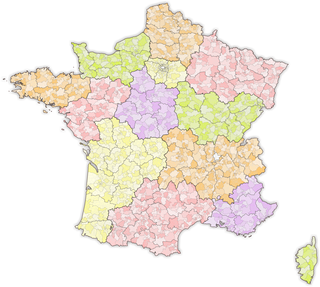
The cantons of France are territorial subdivisions of the French Republic's departments and arrondissements.
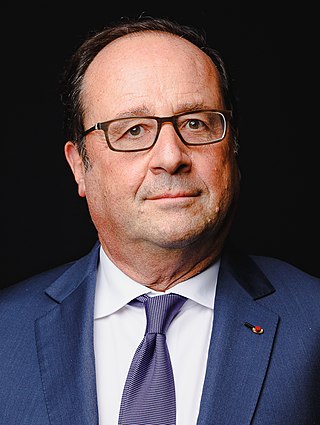
François Gérard Georges Nicolas Hollande is a French politician who served as President of France from 2012 to 2017. Prior to his presidency, he was First Secretary of the Socialist Party (PS) from 1997 to 2008, Mayor of Tulle from 2001 to 2008, as well as President of the General Council of Corrèze from 2008 to 2012. Hollande also held the 1st constituency of Corrèze seat in the National Assembly twice, from 1988 to 1993 and again from 1997 until 2012.
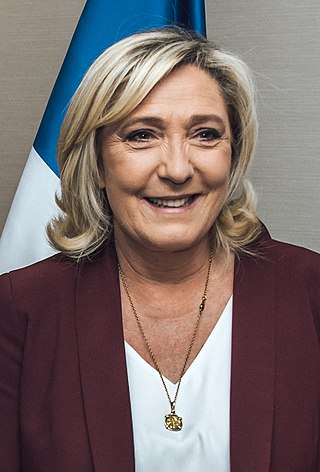
Marion Anne PerrineLe Pen is a French lawyer and politician who ran for the French presidency in 2012, 2017, and 2022. A member of the National Rally, she served as its president from 2011 to 2021. She has been the member of the National Assembly for the 11th constituency of Pas-de-Calais since 2017. She currently serves as parliamentary party leader of the National Rally in the Assembly, a position she has held since June 2022. Le Pen has been widely described as being far-right on the political spectrum.

France is a unitary semi-presidential republic with a bicameral legislature. Public officials in the legislative and executive branches are either elected by the citizens or appointed by elected officials. Referendums may also be called to consult the French citizenry directly on a particular question, especially one which concerns amendment to the Constitution.

The Socialist Party is a French centre-left and social-democratic political party. It holds pro-European views. The PS was for decades the largest party of the "French Left" and used to be one of the two major political parties in the French Fifth Republic, along with The Republicans. It replaced the earlier French Section of the Workers' International in 1969 and is currently led by First Secretary Olivier Faure. The PS is a member of the Party of European Socialists, Progressive Alliance and Socialist International.

Emmanuel Jean-Michel Frédéric Macron is a French politician who has been President of France since 2017. Macron is ex officio one of the two Co-Princes of Andorra. He previously was Minister of Economics, Industry and Digital Affairs under President François Hollande from 2014 to 2016, and as Deputy Secretary-General to the President from 2012 to 2014. He is a founding member of Renaissance.

The Republicans is a conservative political party in France, largely inspired by the Gaullist tradition. The party was formed on 30 May 2015 as the re-incorporation of the Union for a Popular Movement (UMP), which had been established in 2002 under the leadership of then President of France Jacques Chirac.
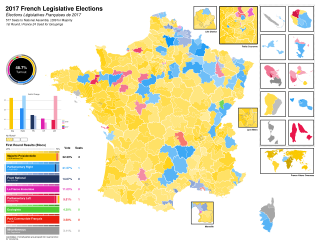
Legislative elections were held in France on 11 and 18 June 2017 to elect the 577 members of the 15th National Assembly of the Fifth Republic. They followed the two-round presidential election won by Emmanuel Macron. The centrist party he founded in 2016, La République En Marche! (LREM), led an alliance with the centrist Democratic Movement (MoDem); together, the two parties won 350 of the 577 seats—a substantial majority—in the National Assembly, including an outright majority of 308 seats for LREM. The Socialist Party (PS) was reduced to 30 seats and the Republicans (LR) reduced to 112 seats, and both parties' allies also suffered from a marked drop in support; these were the lowest-ever scores for the centre-left and centre-right in the legislative elections. The movement founded by Jean-Luc Mélenchon, la France Insoumise (FI), secured 17 seats, enough for a group in the National Assembly. Among other major parties, the French Communist Party (PCF) secured ten and the National Front (FN) obtained eight seats. Both rounds of the legislative election were marked by record low turnout.

Renaissance (RE) is a liberal and centrist political party in France. The party was originally known as En Marche ! and later La République En Marche ! before adopting its current name in September 2022.

Presidential elections were held in France on 10 and 24 April 2022. As no candidate won a majority in the first round, a runoff was held, in which Emmanuel Macron defeated Marine Le Pen and was re-elected as President of France. Macron, from La République En Marche! (LREM), had defeated Le Pen, leader of the National Rally, once already in the 2017 French presidential election, for the term which expired on 13 May 2022. Macron became the first president of France to win a re-election bid since Jacques Chirac won in 2002.
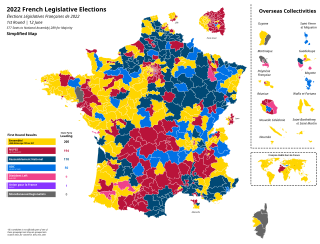
Legislative elections were held in France on 12 and 19 June 2022 to elect the 577 members of the 16th National Assembly of the Fifth Republic. The elections took place following the 2022 French presidential election, which was held in April 2022. They have been described as the most indecisive legislative elections since the establishment of the five-year presidential term in 2000 and subsequent change of the electoral calendar in 2002. The governing Ensemble coalition remained the largest bloc in the National Assembly but substantially lost its ruling majority, resulting in the formation of France's first minority government since 1993.